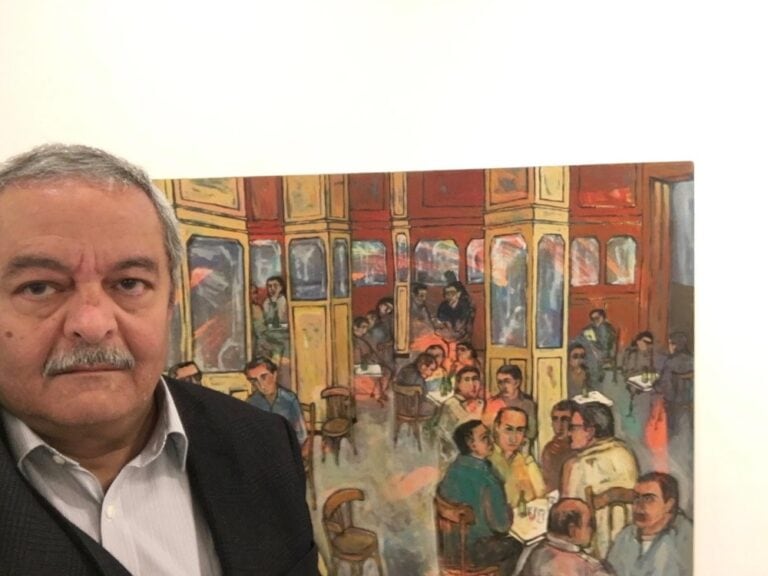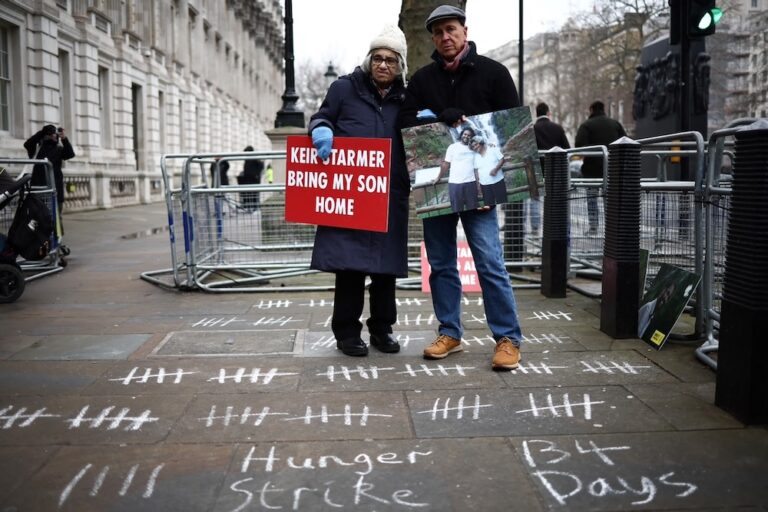The following is a 19 April 2000 CPJ news alert: EGYPT: Five Opposition Journalists Sentenced to Jail Terms New York, April 19, 2000 – A Cairo criminal court sentenced five journalists working for the opposition weekly newspaper Al-Ahrar to six months in prison on April 16 for allegedly libeling Muhammad Fahim al-Rayyan, the chairman of […]
The following is a 19 April 2000 CPJ news alert:
EGYPT: Five Opposition Journalists Sentenced to Jail Terms
New York, April 19, 2000 – A Cairo criminal court sentenced five journalists working for the opposition weekly newspaper Al-Ahrar to six months in prison on April 16 for allegedly libeling Muhammad Fahim al-Rayyan, the chairman of Egypt Air.
Editor Salah Qabdaya, cartoonist Nabil Rizkallah Sadiq, and reporters Hussam Suleiman, Muhammad Abdel Fahim al-Nur, and Hisham Mustafa Tantawi, were given six-month prison terms and fined LE 7,500 (US$2,100) each.
Rayyan filed a libel suit against the five journalists in 1997, over Al-Ahrar’s publication of a series of articles and cartoons that accused him of mismanagement and corruption. The journalists remain free pending the outcome of their appeal.
The court’s verdict comes two weeks after the jailing of three journalists from the opposition biweekly Al-Sha’b. On April 1, editor in chief Magdy Hussein, reporter Saleh Bedeiwi, and cartoonist Essam Hanafi were convicted on appeal for allegedly libeling Youssef Wali, the deputy prime minister and minister of agriculture, and sentenced to prison terms of between one and two years. The journalists are serving their terms in Cairo’s Torah Mazraa Prison. A Cairo appellate court recently rejected their request for a retrial, but their case still awaits final review by the Court of Cassation.
Egypt’s current press law, approved by President Mubarak in 1996, stipulates prison sentences of up to two years for journalists convicted of defamation. Other articles of the penal code contain ambiguous prescriptions that can be used to prosecute and jail journalists. Dozens of Egyptian journalists currently face the possibility of imprisonment if found guilty in defamation cases that are either pending in court or under investigation (see below for case histories).
On May 3, 1999, World Press Freedom Day, CPJ named Mubarak to its annual list of the world’s 10 worst Enemies of the Press.
Recent Jailings of Journalists in Egypt
February 24, 1998
Magdy Hussein, Al-Sha’b
Muhammad Hilel, Al-Sha’b
The Bulaq Misdemeanor Appeals Court upheld a libel conviction against Magdy Hussein, editor in chief of the biweekly, Islamist-oriented Al-Sha’b, and Muhammad Hilal, an editor at the paper. The appellate court confirmed one-year prison sentences against Hussein and Hilal and fined the journalists 7,500LE each (US$2,200) for libeling Alaa’ al-Alfi, the son of former interior minister Hassan al-Alfi. The libel charges stemmed from a series of articles and cartoons published in Al-Sha’b in 1996, alleging that Alaa’ al-Alfi had used his father’s government position to profit from business deals. Hussein and Hilel were taken into custody on March 8 and March 11 respectively, and imprisoned in Torah Mazraa Prison.
On July 2, the Court of Cassation overturned the convictions against the journalists and ordered their release. Both were freed from Torah Mazraa Prison on July 3 after serving four months of their sentence.
March 21, 1998
Gamal Fahmy, Al-Arabi, Al-Dustur
Amer Nassef, Al-Ousbou, Al-Ahrar
Fahmy, managing editor of the now-defunct weekly Al-Dustur and a writer for the weekly Al-Arabi, was taken into custody by police at his Cairo home and brought to Torah Mazraa Prison to begin a six-month prison sentence for libel.
On March 16, an appellate court upheld a criminal conviction against Fahmy for allegedly libeling Egyptian writer Tharwat Abaza. The charge stemmed from a 1995 column in Al-Arabi in which Fahmy criticized Abaza’s views about the 1956 Suez crisis and labeled Abaza’s father a British sympathizer.
Fahmy was the third Egyptian journalist jailed for libel in 1998.
On August 30, Egypt’s Court of Cassation overturned the lower court’s conviction, citing procedural errors in Fahmy’s trial and ordering the journalist’s immediate release, but ruled that Fahmy be retried.
Nassef, a journalist who writes frequently for the weekly Al-Ousbou, was convicted on appeal of having libeled Abaza in a 1996 article published in the daily newspaper Al-Ahrar, which is published by the Liberal Party. He was sentenced to three months in prison. Nassef turned himself in to police on May 25 and began serving his sentence in Torah Mazraa Prison.
In a July 9 letter to Egyptian president Hosni Mubarak, CPJ called on the president to examine legal options to secure the release of Nassef and Fahmy, and to end the use of criminal defamation statutes against journalists.
Nassef was released from prison on August 30, 1998, after completing his term.
August 14, 1999
Magdy Hussein, Al-Sha’b
Saleh Bedeiwi, Al-Sha’b
Essam Hanafy, Al-Sha’b
The South Cairo criminal court convicted three journalists from Al-Sha’b, the biweekly organ of the Socialist Labor party (SLP), of libeling Youssef Wali, the deputy prime minister and minister of agriculture. Those charged were Magdy Hussein, editor of Al-Sha’b, Bedeiwi, a reporter for Al-Sha’b, and Hanafi, a cartoonist for the paper.
Wali filed a complaint against Al-Sha’b on April 1, after several months of the paper’s rancorous criticism of his allegedly treasonous agricultural cooperation with Israel. Among the paper’s accusations were that the minister had imported tainted seeds and fertilizers from Israel that led to increased rates of cancer among the population.
The three journalists were sentenced to two years in prison and ordered to pay a fine of LE20,000 (US$5,900). They were also ordered to pay damages of LE501 (US$150).
Both Magdy Hussein and Bedeiwi were taken into custody shortly after the verdict was announced. They were released in December, 1999, after an appeals court ruled that they had not received a fair trial. Hanafi turned himself in a few days before the court decision and was released along with his colleagues.
In addition to the sentences handed down against Hussein, Bedeiwi, and Hanafi, the court also assessed a LE20,000 (US$5,900) fine against Adel Hussein, secretary general of the SLP, which publishes Al-Sha’b.
April 1, 2000
Magdy Hussein, Al-Sha’b
Saleh Bedeiwi, Al-Sha’b
Essam Hanafy, Al-Sha’b
Editor in chief Hussein, reporter Bedeiwi, and cartoonist Hanafi, of the opposition biweekly newspaper Al-Sha’b, were convicted on appeal of libeling Youssef Wali, the deputy prime minister and minister of agriculture. The charges against the three journalists were initially filed last year in response to a controversial series of articles and cartoons published in Al-Sha’b that criticized Wali’s allegedly treasonous agricultural cooperation with Israel. Among the paper’s many accusations were that the minister had imported tainted seeds and fertilizers from Israel that led to increased rates of cancer among the population.
Hussein and Bedeiwi each received two-year prison terms while Hanafi was given a one- year sentence. All three journalists, along with Adel Hussein, secretary general of the Socialist Labor Party, which publishes Al-Sha’b, were fined 20,000 Egyptian pounds (US$5,900).
Hussein, Bedeiwi, and Hanafi are serving their sentences in Torah Mazraa Prison.


